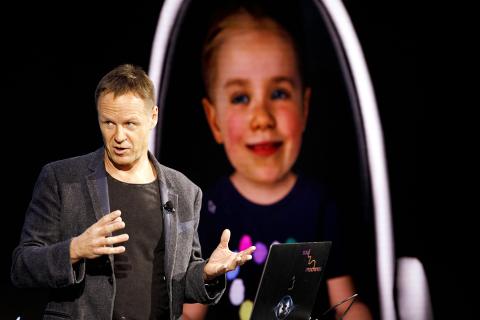Numerous developments in artificial intelligence (AI) were showcased in Taipei on Friday last week, with their developers sharing their vision of the cutting-edge technology that they predict will become more emotionally responsive like humans.
With AI applications such as robots, self-driving cars and automated machinery more pervasive in people’s lives, the technology is to incorporate more human features, Soul Machines Ltd chief business officer Greg Cross said.
“Wouldn’t it be a whole bunch more interesting, wouldn’t these machines be a whole bunch more useful to us, if they were actually more like us?” Cross said at an event focusing on AI development to celebrate Business Week magazine’s 30th anniversary.

Photo: Bloomberg
Cross’ company creates life-like avatars with personality and character and, by “putting a face” on AI, it is opening the door to a new era of human-style customer experience that can be implemented across a wide range of industries, he said.
One of the company’s digital humans, named “Sophie,” incorporates a neural network that combines biologically inspired models of the human brain and sensory networks to create a virtual central nervous system, Cross said.
She is in a trial project with Air New Zealand to answer questions about New Zealand as a tourist destination and the airline’s products and services, Cross said.
LifeBeam Labs founder Omri Yoffe, who is the developer of “Vi,” a voice-activated AI personal trainer that coaches and motivates users through bio-sensing headphones, shared the same concept.
AI technology is meant to inspire humans, Yoffe said, adding that he hopes the voice agent could resemble a true workout companion that brings out the best in people.
“With emotional warmth and companion experiences, we will now be able to trigger people’s minds and help them overcome their motivational barriers,” Yoffe said.
The strength of AI lies in its ability to allow people to interact with each other, said Masa Kawashima, director of Asia-Pacific for Niantic Inc, which wowed the world with Pokemon Go, a free, location-based augmented reality game.
The success of Pokemon Go is a result of AI-boosted technology that encourages people to go outside, explore, be social and stay connected, Kawashima said.
“We want people to share an adventure together,” he said.
Meanwhile, Japanese messaging app operator Line Corp on Friday announced that it plans to expand its services to cover the Internet of Things next year and hopes to find new partners in Taiwan to help with this development.
At the Line Taiwan TechPulse 2017 held in Taipei, attended by more than 700 third-party developers, the messaging company said it hopes to expand the functions and utility of its messaging platform, adding that Taiwan’s strong technology development capabilities and huge talent pool were the reasons behind the event.
Cheng Hung-chia (陳鴻嘉), head of Line’s research and development division, also detailed the company’s upcoming plans for the Internet of Things following the recent introduction of the company’s AI assistant called “Clova.”
Through Clova, Line aims to create a world in which AI seamlessly blends into every device, scenario and environment, he said.

Taiwanese suppliers to Taiwan Semiconductor Manufacturing Co. (TSMC, 台積電) are expected to follow the contract chipmaker’s step to invest in the US, but their relocation may be seven to eight years away, Minister of Economic Affairs J.W. Kuo (郭智輝) said yesterday. When asked by opposition Chinese Nationalist Party (KMT) Legislator Niu Hsu-ting (牛煦庭) in the legislature about growing concerns that TSMC’s huge investments in the US will prompt its suppliers to follow suit, Kuo said based on the chipmaker’s current limited production volume, it is unlikely to lead its supply chain to go there for now. “Unless TSMC completes its planned six

Intel Corp has named Tasha Chuang (莊蓓瑜) to lead Intel Taiwan in a bid to reinforce relations between the company and its Taiwanese partners. The appointment of Chuang as general manager for Intel Taiwan takes effect on Thursday, the firm said in a statement yesterday. Chuang is to lead her team in Taiwan to pursue product development and sales growth in an effort to reinforce the company’s ties with its partners and clients, Intel said. Chuang was previously in charge of managing Intel’s ties with leading Taiwanese PC brand Asustek Computer Inc (華碩), which included helping Asustek strengthen its global businesses, the company

Power supply and electronic components maker Delta Electronics Inc (台達電) yesterday said second-quarter revenue is expected to surpass the first quarter, which rose 30 percent year-on-year to NT$118.92 billion (US$3.71 billion). Revenue this quarter is likely to grow, as US clients have front-loaded orders ahead of US President Donald Trump’s planned tariffs on Taiwanese goods, Delta chairman Ping Cheng (鄭平) said at an earnings conference in Taipei, referring to the 90-day pause in tariff implementation Trump announced on April 9. While situations in the third and fourth quarters remain unclear, “We will not halt our long-term deployments and do not plan to

The New Taiwan dollar and Taiwanese stocks surged on signs that trade tensions between the world’s top two economies might start easing and as US tech earnings boosted the outlook of the nation’s semiconductor exports. The NT dollar strengthened as much as 3.8 percent versus the US dollar to 30.815, the biggest intraday gain since January 2011, closing at NT$31.064. The benchmark TAIEX jumped 2.73 percent to outperform the region’s equity gauges. Outlook for global trade improved after China said it is assessing possible trade talks with the US, providing a boost for the nation’s currency and shares. As the NT dollar